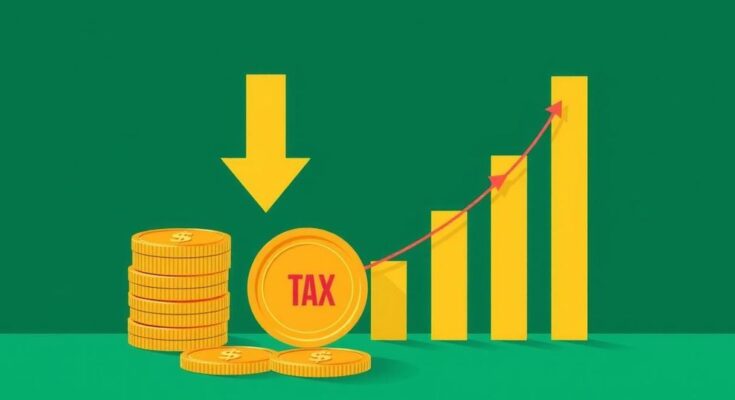Brazilian President Lula has proposed a tax reform to exempt workers earning under BRL5,000 monthly from income tax, benefiting 13.4 million workers. To offset the revenue loss of BRL26 billion, taxes on high-income earners will increase. Lula’s initiative seeks to boost his low approval ratings while addressing Brazil’s regressive tax system.
In a bid to improve his popularity, Brazilian President Luiz Inacio Lula da Silva has proposed a new tax reform aimed at exempting workers earning up to BRL5,000 ($880) per month from income tax. This initiative, introduced to Congress on March 18, seeks to fulfill a crucial campaign promise while addressing Lula’s low approval ratings, which currently sit at approximately 24%. This change is expected to benefit about 13.4 million formal workers, equating to 32% of Brazil’s workforce.
The proposed tax reform would extend exemptions to over 10 million individuals who already qualify under the current threshold of BRL2,824. The President asserted, “This is a neutral project. It won’t increase the country’s tax burden by a cent. What we’re doing is just making amends.” To counterbalance an estimated revenue loss of BRL26 billion ($4.6 billion), the government plans to impose higher taxes on around 114,000 high-income earners, comprising 0.06% of the population, who earn more than $105,000 annually.
This strategy is designed to bolster support from middle-class voters and encourage economic growth. Lula expressed optimism regarding parliamentary support, stating, “Now it’s worth it,” while he emphasized the importance of ensuring tangible improvements in the lives of Brazilians. The initiative addresses long-standing issues within Brazil’s tax system, where poorer citizens contribute more proportionally compared to wealthier individuals, especially in the context of tax-exempt dividends for shareholders.
Additionally, the proposal introduces partial tax discounts for workers earning between BRL5,000 and BRL7,000. Despite concerns regarding possible fiscal motivations behind a projected BRL8 billion ($1.4 billion) surplus, Treasury Executive Secretary Dario Durigan clarified, “we’re not seeking a primary surplus with this measure” but instead advocating for fiscal neutrality. The Speaker of the Chamber of Deputies, Hugo Motta, noted that lawmakers are likely to revise the proposal before it is ratified.
If approved as is, approximately 90% of taxpayers would gain full or partial exemptions from income tax. Despite initial market concerns about fiscal imbalance, Finance Minister Fernando Haddad insisted on the proposal’s fiscal neutrality. Should the reform be approved, the new tax structure is set to commence with the 2026 tax returns, coinciding with the impending presidential election.
President Lula’s tax reform initiative represents a strategic move to enhance his popularity among middle-class Brazilians, addressing pressing economic concerns while offering significant relief to a substantial portion of the workforce. By maintaining fiscal neutrality, the government seeks to offset revenue losses through increased taxation on high-income earners. The proposed changes underscore Brazil’s ongoing challenges in tax equity and affordability, as Lula aims to enact these reforms ahead of the next presidential election.
Original Source: www.intellinews.com




